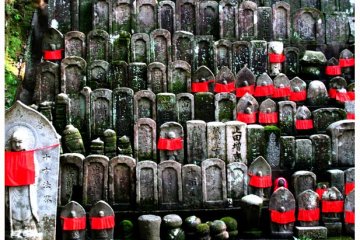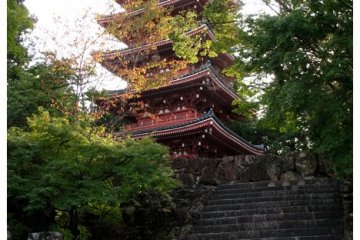Of all the temples I've visited in Japan, Chikurinji on Godaisan, or Mt. Godai, in Kochi still remains to be one of my favorites.
Visiting Kyoto and other major tourist destinations in Japan is a must, but the major temples in those places are always too crowded to give you what Chikurinji does—a surreal feeling where time seems to stand still.
Chikurinji has been more or less vacant most of the times I've been up there. Sometimes, I've been fortunate enough to catch a wedding procession, which are very beautiful. While there is an impressive pagoda, the structures themselves seem to be like any other you might find elsewhere. The thing that is so different about Chikurinji for me is definitely the atmosphere.
Being there on Godaisan, the world comes to a halt. You make your way up the narrow windy road, every meter taking you that much farther away from the city below to a place that feels timeless. Just as in Murakami's book, “Kafka on the Shore”, you wonder at times if you have somehow slipped through to another time altogether. Will you ever get back? Does it really matter?
It's in that world that the feral cats of the mountain welcome you to Chikurinji. There's a small pond viewing garden that, when looked at from the proper angle, gives the illusion that the temple is floating. You can even catch glimpses of Urado Bay in the distance.
Wandering off from the main temple, you find smaller shrines tucked away in the trees, surrounded by a carpet of moss that you're not completely sure you should be walking on—depending on how long you've been in Japan, you may even start looking around for signs to take off your shoes. Take your time to explore as that is where the beauty lies.
There's also a small treasure hall with 17 photogenic Buddhist statues, all nationally protected as important cultural items.
But maybe all of this is to be expected from a temple with such a mysterious history. Emperor Shoumu, after seeing a dream of bowing to Manjusri on Mt. Godai in China in 724 AD, set out to find a similar looking mountain in Japan. Upon finding Godaisan (renamed after the Chinese mountain) in Kochi, he etched an image of Manjusri in a chinaberry tree and built a temple there. Manjusri is still the main deity of the temple today.
If you're planning to do the 88-temple pilgrimage of Shikoku, Chikurinji will be number 31. Even if you don't have such lofty goals as a six-week long hike around the island, I really recommend making your way up to experience the beauty Chikurinji. In my opinion, it's perhaps one of the easiest, most rewarding urban escapes you can possibly find in Japan.









